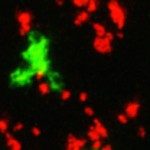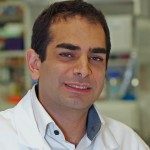Link to Pubmed [PMID] – 24139402
Cell Host Microbe 2013 Oct;14(4):460-7
The immune system can control infectious diseases through different modes of action, including direct killing or spatial confinement. Addressing how the immune system impacts pathogen biology in vivo has remained challenging. We expressed a photoconvertible fluorescent protein in pathogens in order to track their spatial dissemination in infected tissues. In addition, we developed the fluorescence recovery after photoconversion (FRAC) method in order to probe pathogen metabolic activity in vivo. Combining these two approaches in the context of Leishmania major infection of mice and pharmacologically inhibiting iNOS, we found that nitric oxide produced during the immune response to L. major reduces the metabolic activity of intracellular parasites without necessarily exerting direct killing. We propose that this chronic pressure on pathogen proliferation represents a sublethal mode of control required for ultimately resolving the infection. The ability to probe pathogen biology in response to immune defense mechanisms in vivo should create opportunities for better dissecting host-pathogen interactions.



